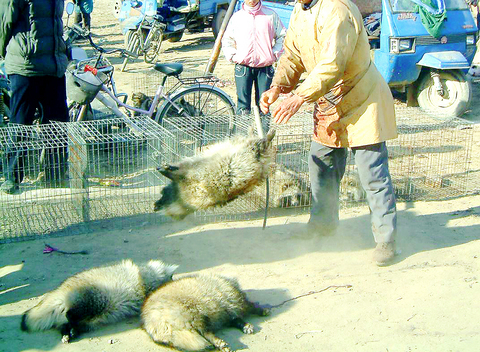China's role as the world's largest exporter of fur garments, with direct links to European and Asian countries, including Taiwan, deserves sharp criticism because of its lack of respect for life, animal rights activists from the Environment and Animal Society of Taiwan (EAST) said yesterday.
EAST released a report on the Chinese fur industry in Taipei yesterday. It is the first ever report from inside China's fur farms and is based on field and desk research carried out last year and last month.
EAST worked in conjunction with groups in Switzerland and the UK, including Swiss Animal Protection, Social Progress for Animal Welfare and Care for the Wild International.

PHOTO: ENVIRONMENT AND ANIMAL SOCIETY OF TAIWAN
At a press conference, video footage taken during researchers' visits to several farms in Hebei Province -- which were raising from 50 to 6,000 animals -- was shown for the first time to the media in Asia.
Animals such as raccoons, foxes, and minks were shown being stunned with repeated blows to the head or by being pounded against the ground. The debilitated animal was then laid on its back or hung upside-down by its hind legs from a hook, and skinning would begin, with a knife inserted in the lower belly.
According to EAST's director, Chen Yu-min (
"We suspect that consumers buying fur products don't know about the brutality involved in the process. Innocent animals suffer for the fashion vanity of humans," Chen said.
According to the report, many animals remained alive after their skin had been stripped off, with breathing, heartbeat, as well as body and eyelid movements all evident for five to 10 minutes.
The report says most Chinese fur farms were established in the past 10 years. Wild species bred for fur include red foxes, Arctic foxes, raccoons, dogs, mink and Rex rabbits.
Wu Hung (
Most animals are killed at about six months old, when they molt for the first time.
Activists said a growing number of international fur traders, processors and fashion designers have gradually shifted business to China, where cheap labor and the absence of restrictive regulations have made it easier to do business and widened profit margins.
Activists said that in the past few years designers have promoted fur in everything from evening wear to sports wear. One fur coat requires the fur of about 80 minks or 25 foxes.
Government statistics in Taiwan suggest that the amount of fur products imported from overseas has increased dramatically, rising from 1,497kg in 2001 to 9,944kg in 2003.
Fur products imported from China, meanwhile, have also increased significantly. In 2003, more than 70 percent of fur products imported were from China. Last year, the percentage rose to 85 percent.
"Why do some consumers in Taiwan, which sits in a sub-tropical area ... need fur products to keep them warm?" Chen said.
Activists said entertainers in show business should take the lead to boycott fur products.
"In China's fur industry, we don't see any spirit to help the weak and aid the needy. Seeing this crime, Taiwan should not become an accomplice," Mary Chen (

Alain Robert, known as the "French Spider-Man," praised Alex Honnold as exceptionally well-prepared after the US climber completed a free solo ascent of Taipei 101 yesterday. Robert said Honnold's ascent of the 508m-tall skyscraper in just more than one-and-a-half hours without using safety ropes or equipment was a remarkable achievement. "This is my life," he said in an interview conducted in French, adding that he liked the feeling of being "on the edge of danger." The 63-year-old Frenchman climbed Taipei 101 using ropes in December 2004, taking about four hours to reach the top. On a one-to-10 scale of difficulty, Robert said Taipei 101

Nipah virus infection is to be officially listed as a category 5 notifiable infectious disease in Taiwan in March, while clinical treatment guidelines are being formulated, the Centers for Disease Control (CDC) said yesterday. With Nipah infections being reported in other countries and considering its relatively high fatality rate, the centers on Jan. 16 announced that it would be listed as a notifiable infectious disease to bolster the nation’s systematic early warning system and increase public awareness, the CDC said. Bangladesh reported four fatal cases last year in separate districts, with three linked to raw date palm sap consumption, CDC Epidemic Intelligence

Taiwanese and US defense groups are collaborating to introduce deployable, semi-autonomous manufacturing systems for drones and components in a boost to the nation’s supply chain resilience. Taiwan’s G-Tech Optroelectronics Corp subsidiary GTOC and the US’ Aerkomm Inc on Friday announced an agreement with fellow US-based Firestorm Lab to adopt the latter’s xCell, a technology featuring 3D printers fitted in 6.1m container units. The systems enable aerial platforms and parts to be produced in high volumes from dispersed nodes capable of rapid redeployment, to minimize the risk of enemy strikes and to meet field requirements, they said. Firestorm chief technology officer Ian Muceus said

MORE FALL: An investigation into one of Xi’s key cronies, part of a broader ‘anti-corruption’ drive, indicates that he might have a deep distrust in the military, an expert said China’s latest military purge underscores systemic risks in its shift from collective leadership to sole rule under Chinese President Xi Jinping (習近平), and could disrupt its chain of command and military capabilities, a national security official said yesterday. If decisionmaking within the Chinese Communist Party has become “irrational” under one-man rule, the Taiwan Strait and the regional situation must be approached with extreme caution, given unforeseen risks, they added. The anonymous official made the remarks as China’s Central Military Commission Vice Chairman Zhang Youxia (張又俠) and Joint Staff Department Chief of Staff Liu Zhenli (劉振立) were reportedly being investigated for suspected “serious